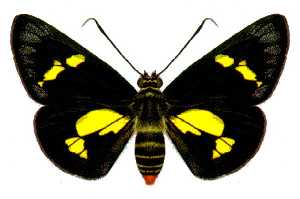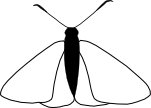Regent skipper facts for kids
Quick facts for kids Regent skipper |
|
|---|---|
 |
|
| Conservation status | |
|
Not evaluated (IUCN 3.1)
|
|
| Scientific classification |
|
| Kingdom: | Animalia |
| Phylum: | Arthropoda |
| Class: | Insecta |
| Order: | Lepidoptera |
| Family: | Hesperiidae |
| Subfamily: | Euschemoninae Kirby, 1897 |
| Genus: | Euschemon Doubleday, 1846 |
| Species: |
E. rafflesia
|
| Binomial name | |
| Euschemon rafflesia (Macleay, [1827])
|
|
| Script error: The function "autoWithCaption" does not exist. | |
| Synonyms | |
|
Several, see text |
|
Script error: No such module "Check for conflicting parameters".
The regent skipper (scientific name: Euschemon rafflesia) is a special kind of butterfly. It belongs to the skipper family, called Hesperiidae. You can find this butterfly only in Australia. It's quite unique because it's the only species in its group, known as the Euschemon genus, and its smaller family group, the Euschemoninae subfamily.
What Kind of Butterfly Is It?
For a long time, scientists weren't sure exactly where the regent skipper fit in the butterfly family tree. It was often grouped with other "spread-winged skippers." But it's so different from other skippers that many scientists now agree it deserves its very own group. This means it's the only butterfly in its special subfamily, Euschemoninae. This idea was first suggested by a scientist named William Forsell Kirby way back in 1897.
Other Names
The regent skipper has been known by a few different names over the years. This is because it can look a bit different from one butterfly to another. These older names are now called "junior synonyms." Some of these names include:
- Euschemon alba
- Euschemon alboornatus
- Euschemon viridis
- Exometoeca rafflesia
- Hesperia rafflesia
A scientist named William Sharp Macleay gave the butterfly its original name, rafflesia. He named it after Sir Stamford Raffles. Macleay wanted to honor Raffles for his important scientific work in Java and Sumatra.
What Does It Look Like?
The regent skipper is not as big as some butterflies, but it's quite large compared to most other skippers. Its common name, "regent," comes from its bright and fancy colors. It's mostly black with bright yellow and red spots and stripes. These colors make it easy to spot!
One very interesting thing about the male regent skipper is how its wings connect. Most butterflies don't have a special hook-and-loop system to hold their front and back wings together when they fly. But the male regent skipper does! It has a tiny hook called a frenulum and a small loop called a retinaculum. These parts link the wings together, helping the butterfly fly better. This special feature is very rare among butterflies.
- For more information, you can check out the Tree of Life Web Project's page on Euschemoninae.


